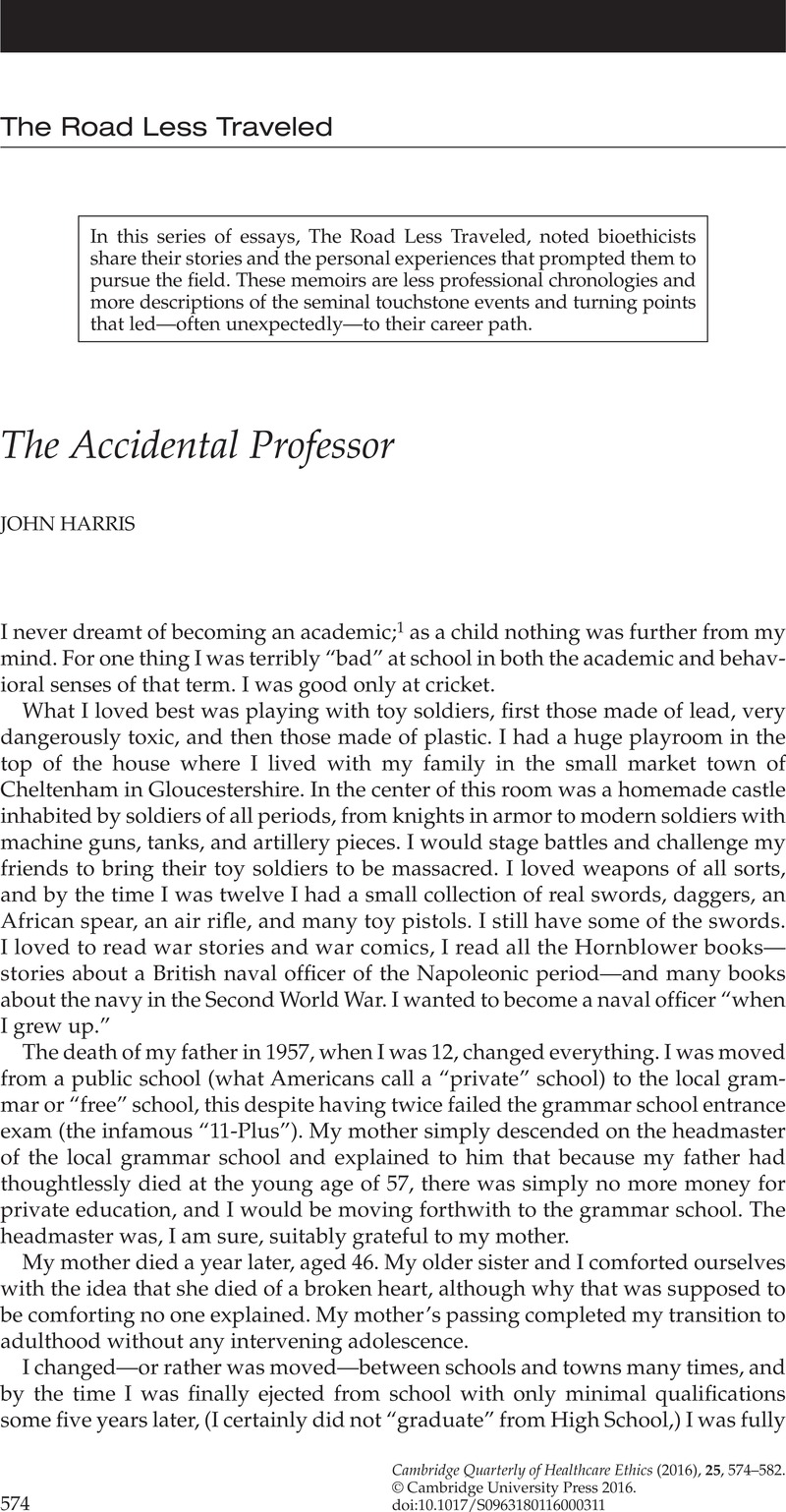No CrossRef data available.
Article contents
The Accidental Professor
Published online by Cambridge University Press: 16 September 2016
Abstract

- Type
- The Road Less Traveled
- Information
- Cambridge Quarterly of Healthcare Ethics , Volume 25 , Special Issue 4: Clinical Neuroethics , October 2016 , pp. 574 - 582
- Copyright
- Copyright © Cambridge University Press 2016
References
Notes
1. With apologies to John Carey. See Carey, J. An Unexpected Professor. Oxford: Oxford University Press; 2014.Google Scholar This selective biography follows lines taken in my paper “Thought and Memory”: Harris J. Thought and memory. In: Coggon J, Holm S, Chan S, Kushner T, eds. From Reason to Practice in Bioethics: An Anthology Dedicated to the Works of John Harris. Manchester: Manchester University Press; 2015, at 16–30.
2. I also first saw the similarly titled film at that time. Les Enfants du Paradis, released as Children of Paradise in North America, is a 1945 French film directed by Marcel Carné.
3. I have talked about this in my paper “Wicked or Dead.” See Harris J. Wicked or dead? Reflections on the moral character and London: Wiley Blackwell; 2009, at 33–41.
4. Arendt, H. Eichmann in Jerusalem. London: Penguin Books; 2006, at 279.Google Scholar
5. See note 4, Arendt 2006, at 252.
6. Harris, J. Violence and Responsibility. London: Routledge and Kegan Paul; 1980, see chap. 7 and 8.Google Scholar
7. That’s another story.
8. Harris, J. The survival lottery. Philosophy 1975 Jan;50:81–8.CrossRefGoogle ScholarPubMed Harris J. The Marxist conception of violence. Philosophy & Public Affairs 1974 Winter;3:192–221.
9. Foot, P. The problem of abortion and the doctrine of the double effect. In: Virtues and Vices. Oxford: Basil Blackwell; 1978.Google Scholar This work originally appeared in the Oxford Review 1967, no. 5. Thomson JJ. Killing, letting die, and the trolley problem. The Monist 1976;59:204–17. Thomson JJ. The trolley problem. Yale Law Journal 1985;94:1395–1415. Kamm F. Harming some to save others. Philosophical Studies 1989;57:227–60.
10. Others since have made more detailed studies of lotteries as an instrument of justice. See Goodwin B. Justice by Lottery. Hemel Hempstead: Harvester, Wheatsheaf; 1992. Duxbury, N. Random Justice. Oxford: Oxford University Press; 1999.CrossRefGoogle Scholar Broome J. Selecting people randomly. Ethics 1984;95:38–55. Broome J. Uncertainty and fairness. The Economic Journal 1984;94:624–32. Broome J. Fairness. Proceedings of the Aristotelian Society 1990;91:87–101.
11. Harris J. QALYfying the value of life. Journal of Medical Ethics 1987 Sept:117–23. [Reprinted in Downie RS, ed. Medical Ethics. Dartmouth: Aldershot; 1996.] Harris, J. Life: Quality, value and justice. Health Policy 1988;10:259–66.CrossRefGoogle ScholarPubMed Harris J. Unprincipled QALYs. Journal of Medical Ethics 1991 Dec;17(4):185–8. Harris J. Is gene therapy a form of eugenics? Bioethics 1993 Apr;7(2/3):178–87. [Reprinted in Downie RS, ed. Medical Ethics. Dartmouth: Aldershot; 1996.] Harris J. Does justice require that we be ageist? Bioethics 1994 Jan;8(1):74–84. Harris J. Double jeopardy and the veil of ignorance. Journal of Medical Ethics 1995 June;21(3):151–7. Harris J. Would Aristotle have played Russian roulette? Journal of Medical Ethics 1996 Aug;22(4):209–15. Brazier M, Harris J. Public health and private lives. The Medical Law Review 1996 Summer;4:171–92. Harris J. Could we hold people responsible for their own adverse health? The Journal of Contemporary Health Law and Policy 1996;1:100–6. Harris J. What is the good of health care? Bioethics 1996;10(4):269–92. Harris J. What the principal objective of the NHS should really be. The British Medical Journal 1997 Mar 1;314:669–72. [Reprinted in New B, ed. Rationing: Talk and Action in Health Care. London: BMJ; 1997:100–6.] Harris J. Justice and equal opportunities in health care. Bioethics 1999 Oct;13(5):392–405. Harris J. The age indifference principle and equality. Cambridge Quarterly of Healthcare Ethics 2005;14:93–9.
12. Harris, J. Ethical problems in the management of some severely handicapped children. Journal of Medical Ethics 1981 Sept;7(3):117–24.CrossRefGoogle ScholarPubMed
13. Marx K. Theses on Feuerbach. No XI. In: Fuer L, ed. Marx and Engels. London: Collins, Fontana; 1972. What Marx actually said was “The philosophers have only interpreted the world, in various ways; the point however, is to change it.”
14. Russell, B. The harm that good men do. In: Russell, B. Sceptical Essays. London and New York: Routledge; 2005, at 91.Google Scholar
15. De Lampedusa, GT. The Leopard. London: Vantage, Random House; 2005, at 27.Google Scholar De Lampedusa GT. Il Gattopardo. 86th ed. Milan: Universale Economica Feltrinelli; 2005 Aug. [1957].


